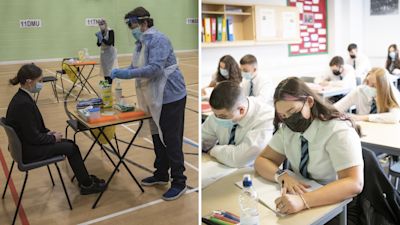Covid testing in schools: How will it work? What happens if my child tests positive?

Video by ITV News Video Producer Natalia Jorquera
Words by ITV News Multimedia Producer Ann Yip
As schools in England reopen, teachers and secondary school students will be expected to get tested for Covid-19 regularly.
The government is giving millions of children access to rapid testing under its roadmap plans for schools to safely reopen from March 8.
It is hoped that measures, including regular testing and face masks in corridors, will help ensure GCSE pupils and A-level students do not miss out on their education because of the pandemic.
Here's how testing in schools will work:
Covid tests and face masks 'not compulsory' but 'recommended' at schools, says education minister
Covid: 78% of headteachers say testing will take time away from teaching
Who needs to be tested regularly?
Staff and students at secondary schools and colleges - including special schools, private schools and hospitals schools - will be offered two tests a week. The government said it is prioritising these schools because they face greater disruption from the spread of coronavirus.
Whole families of these children will also be able to test themselves twice a week from home.
Staff in primary schools and early years will also be offered two tests a week.
But primary school pupils will not be tested. According to Public Health England, there are limited public health benefits attached to testing primary pupils. It added younger children may find the testing process unpleasant and may be unable to self-swab.
How will testing in schools work?
In the first two weeks of schools reopening from March 8, there will be three tests at school and one at home. The first three tests at school will be seen as training for the children.
Thereafter, pupils and staff will be given rapid lateral flow tests to take twice a week at home. It is recommended that tests are done before coming into school, ideally in the morning.
Schools may start testing pupils and staff before March 8 if they wish to do so.
Lateral flow tests are easy-to-use swab tests that provide a result within 30 minutes - similar to home pregnancy test kits. It involves taking a sample from the back of the throat, the swab is then dipped into an extraction solution, which is dripped onto the device's paper pad.
What happens if my child tests positive?
The student or staff member who tested positive will need to tell the school about the result, go home if they are in school, and self-isolate for 10 days or until they have recovered from any symptoms. People they live with must also self-isolate.
If they tested positive with a lateral flow test at home, they must also book a PCR lab test. If they tested positive at school, they will not need to do so.
The student or staff member will need to test themselves with lateral flow test kits two more times afterwards - with each test spaced three to five days apart.
How will school testing sites work?
Secondary schools and colleges are expected to have a designated testing site (Asymptomatic Testing Site) - although in most cases, staff and students will be testing themselves at home.
The testing site will be for students who are unable to test themselves at home.
The workforce in these school testing sites could be made up of existing staff or volunteers.
Who is paying for the tests and how much could the whole scheme cost?
The government will be paying for the testing programme, with the amount of funding dependent on the number of tests carried out.
The government has not specified how much the mass testing programme will cost, but 2019/20 data suggests there are around 3.4 million secondary school and college students in England.
So with plans to have as many as three tests a week, that adds up to millions of tests. School staff and students' families are also entitled to regular testing, and there may be additional costs related to school testing venues.
Is it compulsory to test my child twice a week?
Testing is not compulsory but the government is strongly encouraging staff and students to test themselves regularly.
Any testing at school will require consent from the person being tested, or their parent if they are under 16.
Those who develop Covid-19 symptoms, however, must follow government guidance as normal - not going to school, self-isolating and booking a lab test via gov.uk/get-coronavirus-test or by calling 119.
How will students in England receive exam grades this summer?
How the rest of Europe tackled the issue of schools during the Covid pandemic
Listen to our podcast - Coronavirus: What you need to know